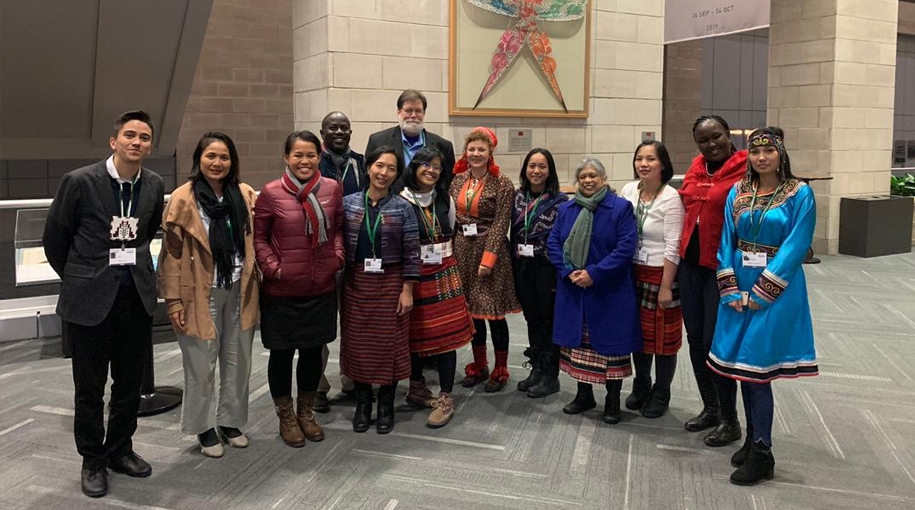BAGUIO CITY, Philippines – A total of twelve (12) participants from Elatia and the International Indigenous Forum on Biodiversity (IIFB) attended the CBD Advocacy and Negotiations Training between November 2019 and February 2020, held alongside with Eleventh Meeting of the Ad Hoc Open-ended Working Group on Article 8(j) and Related Provisions of the Convention on Biological Diversity (WG8J 11), Twenty-third meeting of the Subsidiary Body on Scientific, technical and Technological Advice (SBSTTA 23), and the second meeting of the Open-ended Working group on the Post-2020 Global Biodiversity Framework, respectively.
The trainings were composed of four phases. Phase 1 is the web-based component where the trainees attended a webinar that provided basic information on the CBD Post-2020 Global Biodiversity Framework. Phase 2 was dedicated for a two-day face-to-face training with four mentors to guide and advise the participants, in the persons of Jennifer Tauli-Corpuz Jing Corpuz (Nia Tero), Preston Hardison (Tulalip Tribes), Joji Carino (Forest Peoples Programme) and Gillian Dunuan (National Commission on Indigenous Peoples, Philippines). The mentors shared the history of the CBD, its objectives and methods of work of indigenous peoples engagement, process to adopt the Post-2020 Global Biodiversity Framework and basic advocacy and negotiation skills training.
The practical or hands-on component of the training constitute Phase 3 where the training team guides the participants as they put into practice the skills they learned during the face-to-face session during the different CBD meetings. Phase 4 involves a follow-up and participation in other CBD meetings based on the participants’ performance in the first 3 phases of the training.
A follow up training was held in Rome, Italy, where five (5) trainees from the first training came back to act as peer mentors to the new participants.
The trainings are a timely introduction to the CBD process, as negotiations are taking place to come up with the Post 2020 Global Biodiversity Framework, which seeks to be a global framework to address the world’s current biodiversity crises and to put the world on track to a more ambitious way to conserve and protect biodiversity for future generations.
“The opportunity makes me think of possible activities to connect international work to national and community work”, Eunice Sinore Nkopio of the Maasai Pastoralists Integrated Development Organization (MPIDO), Kenya, said about the training. Her organization is involved in community monitoring work, such as Indigenous Navigator (IN) and Community Based Monitoring and Information System (CBMIS).
Ida Maria of the Saami Council, Finland, said that attending the training helped her become more equipped to help in the advocacy work of her organization. She is also regular attendee of the UN Permanent Form on Indigenous Issues (#UNPFII).
Alice of BC Initiative, Malaysia, who has already previously attended a CBD meeting, realized the need for a better communication strategy from Indigenous Peoples and Local Communities (IPLCs), to garner support in the negotiations. “Conservation
NGOS sometimes come with their own agenda. We [indigenous peoples] also need to communicate that they cannot impose their framework on our way of life”, she added.
Dilya of Center of Indigenous Peoples of the North (CSIPN), Russia and Aaron of the Tulalip Tribes, USA, both newcomers to CBD processes, were also thankful for the experience, despite the steep learning curve. “The knowledge gained at the participation in the training, I want to share in my region”, Dilya said, while Aaron was inspired, as with the others, to influence their national positions. “The representative of US is not someone we can really influence, so I have to find the right avenues.
When I go back home, I have to exercise my analytical side and writing side”, he added.
The training was organized by the ELATIA Indigenous Peoples’ Training Institute (through Tebtebba Indigenous, Tebtebba and ILEPA), with support from Nia Tero. The trainings aim to facilitate learning and skills development in the area of advocacy and negotiations for newcomers in the IIFB, so as to enable #indigenous peoples to participate more effectively in the #CBD processes.


